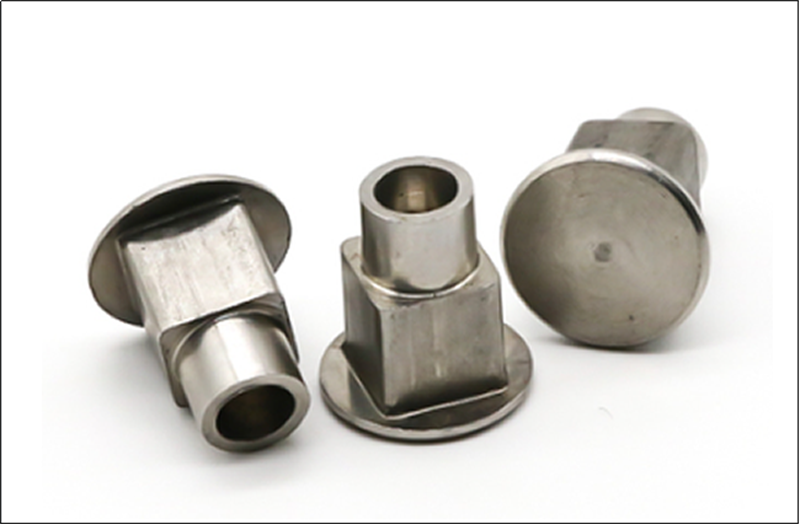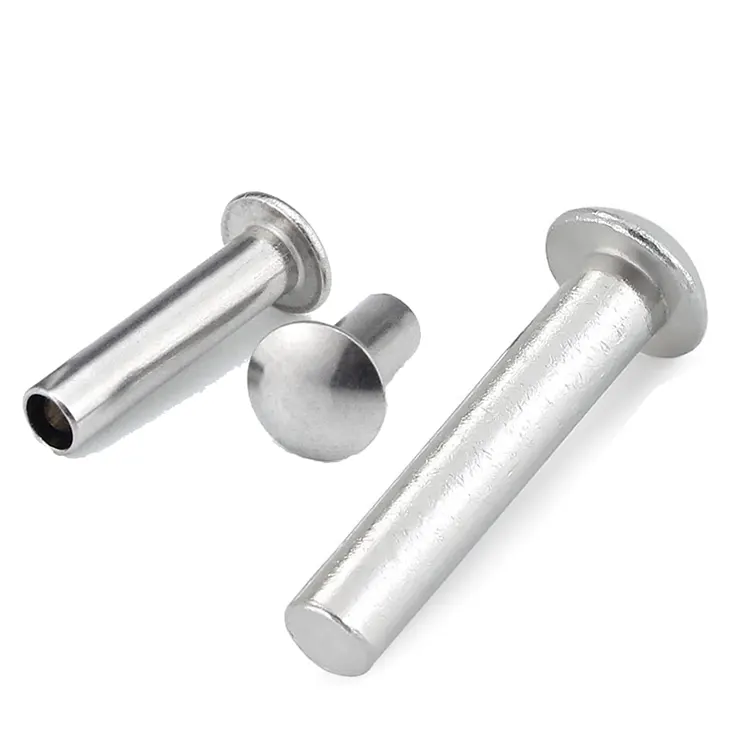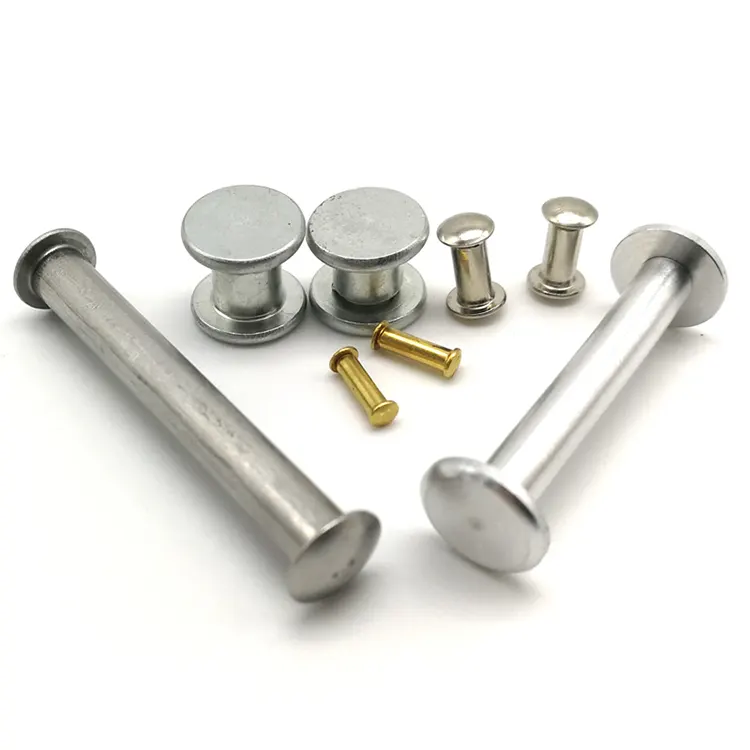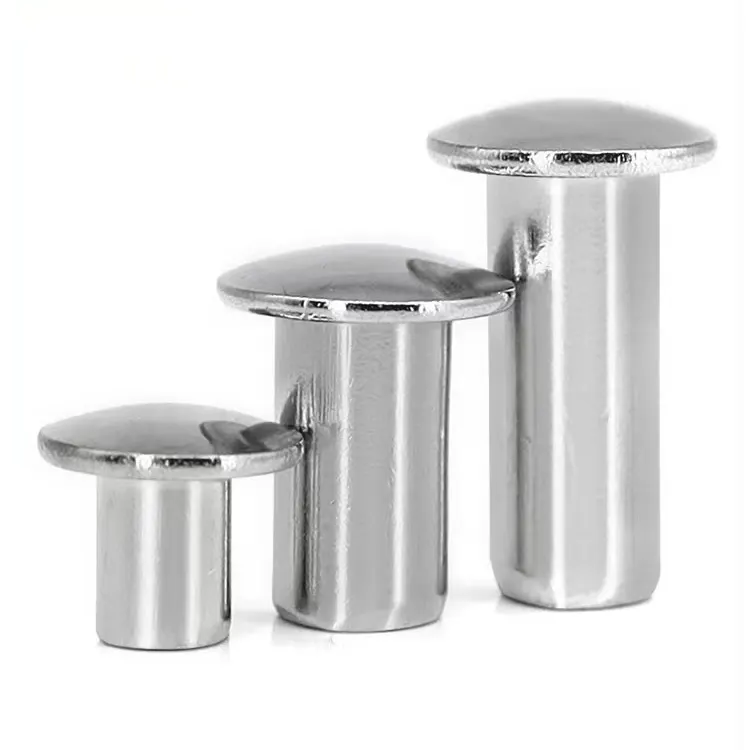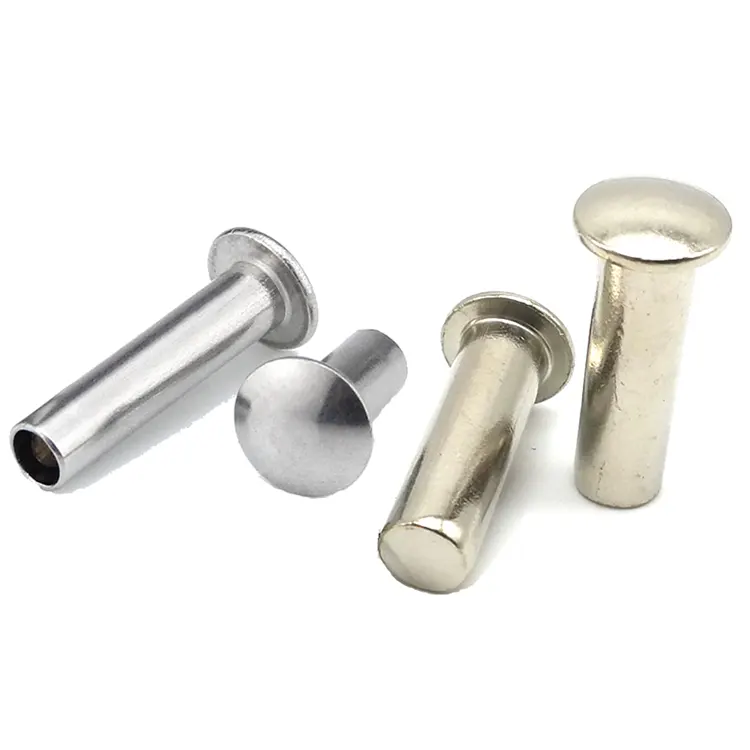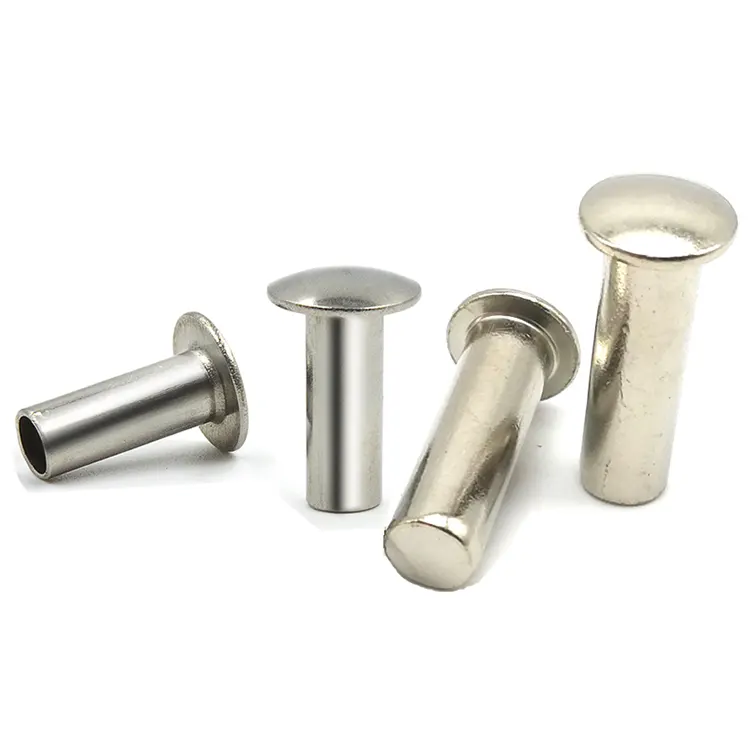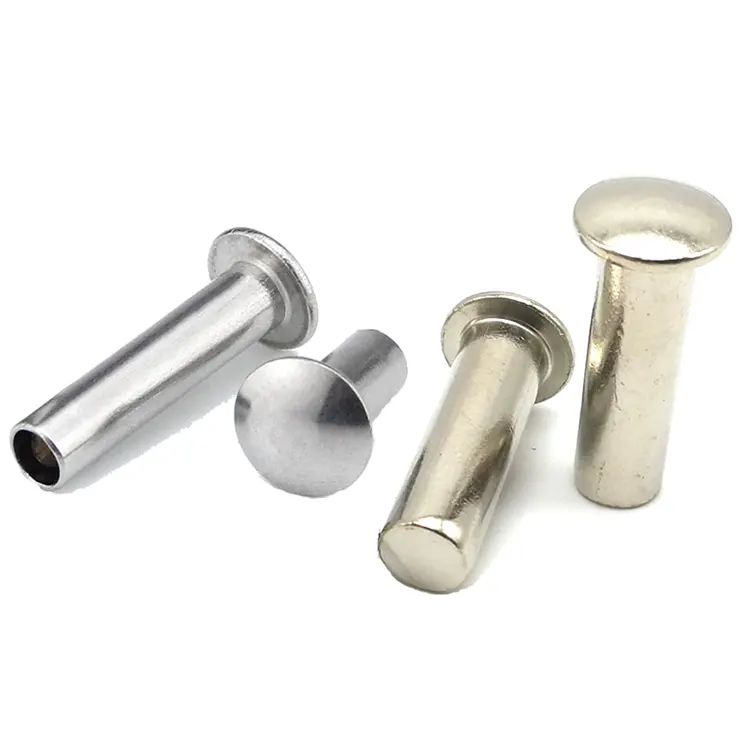Spezielle Nieten
One of Chinese manufacturer of Special Rivets, offering excellent quality at a competitive price, is Notin. Feel free to get in touch.
In the field of mechanical manufacturing and assembly, rivets are a common fastener used to professionally connect two or more parts. According to the degree of standardization, rivets can be divided into two categories: standard rivets and non-standard rivets. The size, shape and material of standard rivets are uniformly specified, while non-standard rivets are customized according to specific needs. The following will introduce the characteristics and applications of non-standard rivets from multiple aspects.
What are non-standard rivets?
Non-standard rivets are also called special rivets. They refer to rivets that do not meet national standards or industry general standards. Their size, material, structure and other parameters are designed and manufactured according to the specific needs of customers. Due to the different connection requirements of different industries and equipment, standard rivets may not meet the requirements of certain special scenarios, so non-standard rivets came into being.
What are the characteristics of special rivets?
(1) Strong customization: Non-standard rivets can be personalized according to factors such as the use environment, stress conditions, and assembly methods to ensure that they perform well in actual applications.
(2) Diverse materials: In addition to common carbon steel and stainless steel, non-standard rivets can also be made of special materials such as aluminum alloy, copper alloy, titanium alloy, etc. to meet different corrosion resistance, strength and weight requirements.
(3) Flexible structure: The structure of non-standard rivets can be adjusted according to needs, such as head shape, stem diameter, length, etc., and can even be designed to be hollow, semi-hollow or other special shapes.
- View as
Universelle Kopfnieten
Ein Universalkopfniet ist eine Art mechanisches Verbindungselement im Nietklassifizierungssystem. Sein Kopf hat eine flache, bogenförmige Struktur und eignet sich zum Verbinden von Materialien wie dünnen Metallblechen, Leder, Leinwand und Holz. Diese Art von Nieten werden durch Kalt- oder Heißnietverfahren befestigt und bieten die Vorteile einer einfachen Installation und Kosteneffizienz in nicht abgedichteten, drucktragenden Umgebungen. Im Vergleich zu ähnlichen Produkten wie Senknieten eignen sich Universalkopfnieten aufgrund ihres hervorstehenden halbkugelförmigen Kopfdesigns besser zum Nieten dünner Metallbleche oder nichtmetallischer Materialien wie Leder, Leinwand und Holz.
WeiterlesenAnfrage absendenZweiteilige Nieten
Zweiteilige Nieten bestehen typischerweise aus zwei Teilen: einem Innenniet und einem Außenniet. Der Innenniet hat an einem Ende ein Innenloch und am anderen ein festes Ende. Der männliche Niet, wie ein FestkörperStufenniet, passt in das Innenloch der Innenniete. Befestigen Sie zur Verwendung zunächst die Innenniete an einem Gegenstand, setzen Sie dann die Außenniete in die Innenniete ein und hämmern Sie sie fest, um so die beiden Gegenstände zu verbinden. Dieses Design vereinfacht die Installation und bietet gleichzeitig eine zuverlässige Verbindungsstärke. Nuote Metals verfügt über 10 Jahre Berufserfahrung mit dieser Art von zweiteiligen Nieten. Gerne können Sie uns Ihre Zeichnung zusenden.
WeiterlesenAnfrage absendenFachwerkkopfnieten
Nuote Metals produziert und vertreibt Flachrundnieten. Wir haben unseren Sitz in Dongguan, China, und verfügen über mehr als 40 Kaltstauchmaschinen, die in der Lage sind, ein breites Spektrum an Nietspezifikationen und -typen herzustellen. Wir bieten auch kundenspezifische Nieten an. Fachwerkkopfnieten sind eine übliche Nietkomponente, die aus einem Schaft, einem Kopf und einem Schwanz besteht. Sie zeichnen sich durch einen großen, flachen Kopf und einen hohlen oder massiven Schwanz aus und bieten hervorragende Dichtungs- und Wasserabdichtungseigenschaften.
WeiterlesenAnfrage absendenRundkopfnieten aus Stahl
Nuote Metals produziert und vertreibt Rundkopfnieten aus Stahl in verschiedenen Ausführungen, darunter Verzinkung, Vernickelung und Dacromet-Beschichtung. Rundkopfnieten zeichnen sich durch eine halbrunde Kopfform aus, die eine hervorragende Zug- und Scherfestigkeit bietet und hohen Belastungen standhält. Durch das Rundkopfdesign passt sich der Niet beim Verbinden besser an die Verbindungskomponente an und verbessert so die Stabilität und Abdichtung der Verbindung.
WeiterlesenAnfrage absendenStahlnieten
Nieten aus Kohlenstoffstahl sind ein gängiges mechanisches Befestigungselement, das in einer Vielzahl von Industrie- und Alltagsprodukten verwendet wird. Ihre Hauptfunktion besteht darin, zwei oder mehr Komponenten sicher miteinander zu verbinden und so eine stabile Struktur zu schaffen. Nieten aus Kohlenstoffstahl sind aufgrund ihrer Festigkeit, Haltbarkeit und Kosteneffizienz beliebt. Nuote Metals stellt seit über einem Jahrzehnt Nieten aus Kohlenstoffstahl her. Wir befinden uns in Dongguan, China, bekannt als „Fabrik der Welt“, und heißen Besucher aus der ganzen Welt willkommen.
WeiterlesenAnfrage absendenFlachkopfnieten aus Stahl
Flachkopfnieten aus Stahl sind gängige industrielle Befestigungselemente, die in einer Vielzahl von Anwendungen eingesetzt werden, darunter in der Automobil-, Luftfahrt- und Baubranche. Nuote Metals ist auf die Herstellung von Flachkopfnieten aus Stahl spezialisiert, die weltweit verkauft werden. Wir bieten eine große Auswahl an Nieten aus verschiedenen Materialien, darunter Messing, Edelstahl, Aluminium und Kupfer. Wir können unsere Produkte auch mit verschiedenen Oberflächenbehandlungen wie Galvanisieren, Beizen und Eloxieren individuell an die Kundenanforderungen anpassen.
WeiterlesenAnfrage absendenWhat are the characteristics of special rivets?
(1) Strong customization: Non-standard rivets can be personalized according to factors such as the use environment, stress conditions, and assembly methods to ensure that they perform well in actual applications.
(2) Diverse materials: In addition to common carbon steel and stainless steel, non-standard rivets can also be made of special materials such as aluminum alloy, copper alloy, titanium alloy, etc. to meet different corrosion resistance, strength and weight requirements.
(3) Flexible structure: The structure of non-standard rivets can be adjusted according to needs, such as head shape, stem diameter, length, etc., and can even be designed to be hollow, semi-hollow or other special shapes.
Manufacturing process of special rivets
The manufacturing of non-standard rivets involves multiple links, mainly including:
1.Material selection: Select suitable metal or alloy materials according to the use environment. 2. 2.Cold heading or hot heading: Use pressure processing to form the basic shape of the rivet into the metal blank.
3.Turning or milling: Fine-process the details such as the head and stem of the rivet to ensure dimensional accuracy.
4.Surface treatment: Such as galvanizing, nickel plating, anodizing, etc. to improve corrosion resistance or aesthetics.
Advantages and limitations of special rivets
(1) Advantages: They can meet special needs, improve assembly efficiency and connection reliability, and are suitable for complex or high-demand application scenarios.
(2) Limitations: Since they are customized products, the production cost is high, the delivery cycle is relatively long, and customers are required to provide detailed technical parameters.
How to choose suitable special rivets?
(1) Clarify the needs: Determine the key parameters such as the rivet's operating environment, stress conditions, and corrosion resistance requirements.
(2) Material matching: Select the appropriate material based on actual needs to avoid over-design that leads to increased costs.
(3) Communicate with suppliers: Provide detailed technical drawings or samples to ensure that the non-standard rivets produced meet expectations.
What are the main applications of special rivets?
(1) Aerospace: Aircraft, rockets and other equipment have extremely high requirements for the weight, strength and high-temperature resistance of fasteners. Non-standard rivets can be optimized according to specific needs.
(2) Automobile manufacturing: Certain special models or high-performance vehicles may require non-standard rivets to meet the needs of lightweight or high-strength connections.
(3) Electronic equipment: Precision instruments or small electronic equipment may require micro non-standard rivets to ensure the stability and compactness of the connection.
(4) Construction industry: Some special-structured buildings or decoration projects may use non-standard rivets to meet specific installation requirements.
Market status of special rivets
With the advancement of industrial technology, more and more industries have begun to use non-standard rivets to optimize product design. At present, non-standard rivet manufacturers are mainly concentrated in the Yangtze River Delta and Pearl River Delta regions in China, and can provide a variety of customized services. Due to the high unit price of non-standard rivets, its market size is relatively small, but the demand in the high-end manufacturing field continues to grow.
Future development trends
(1) Lightweight design: With the improvement of energy-saving and environmental protection requirements, non-standard rivets made of lightweight materials will be more popular.
(2) Intelligent production: Automated equipment and digital management will further improve the production efficiency and quality stability of non-standard rivets.
(3) Wider application: Emerging industries such as new energy and robotics may drive the growth of demand for non-standard rivets.
In summary, special rivets are highly customized fasteners that can meet special needs that standard rivets cannot meet. Although its production cost is relatively high, it plays an irreplaceable role in industries such as aerospace, automobiles, and electronics. In the future, with the advancement of manufacturing technology, the application scope of non-standard rivets is expected to further expand.






